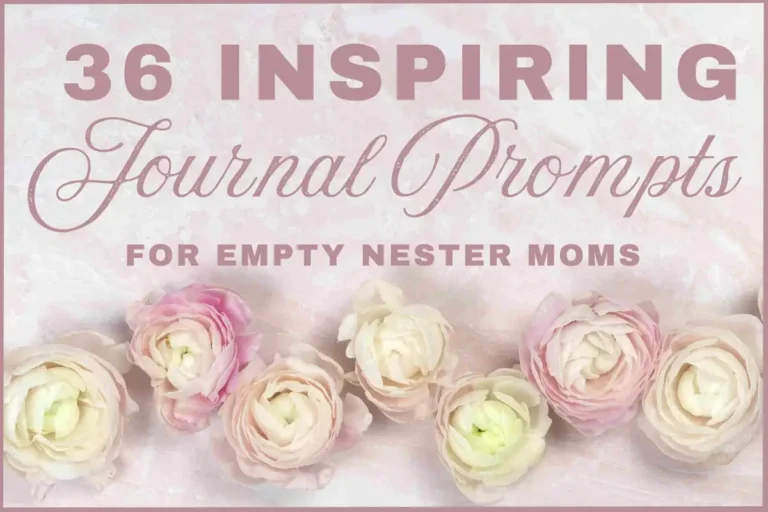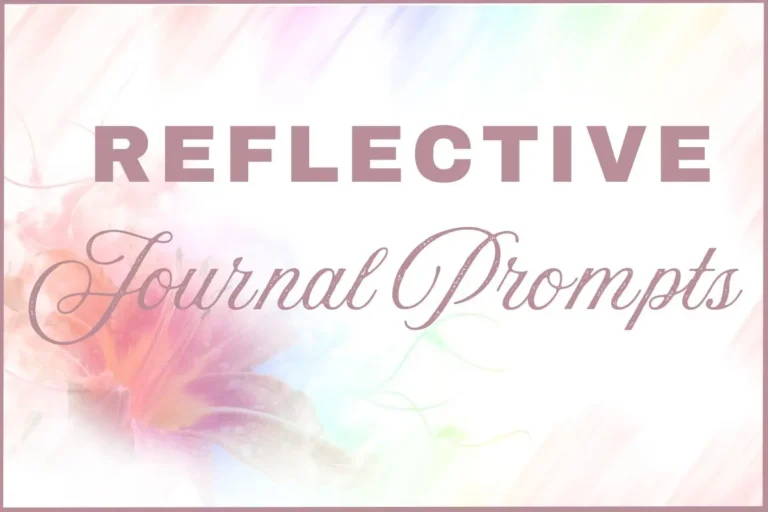12 Transformative Benefits of Journaling for Empty Nester Moms
As an empty nester, it’s natural to experience a whirlwind of emotions.
On the one hand, there’s an undeniable pride and joy in seeing your child all set to carve their own path.
On the other hand, there’s that unmistakable feeling of emptiness and uncertainty.
The quiet can be overwhelming, and figuring out how to fill the space – both physically and emotionally – can feel like a challenge.
At times like this, you’re at the threshold of a new journey as much as your child is.
When your thoughts and emotions are in a state of turmoil, journaling offers a simple yet powerful way to process these feelings, rediscover yourself, and create a new sense of purpose.
Understanding the Emotional Transition of Empty Nesting
When children leave home, it’s not just their bedrooms that feel empty—it’s your sense of identity, too. For many moms, the role of caregiver has been central for decades. Once that daily responsibility fades, a wave of emotions can surface.
While this stage of life can feel isolating, it does give you pause to reflect on your own needs and desires – things that may have been on the back burner for years.
Finding new ways to channel your energy and discover your purpose is essential.
Whether it’s exploring hobbies, volunteering, or personal growth through practices like journaling, these outlets offer emotional relief and help rebuild a sense of fulfillment.
Think of it as planting new seeds in a garden that’s ready to flourish.
12 Psychological & Emotional Benefits of Journaling for Empty Nester Moms

Journaling is more than just writing down thoughts—it’s a lifeline for empty nester moms navigating a significant life transition. When the house quiets down and the years of caregiving shift into a new chapter, it’s easy to feel both untethered and overwhelmed.
Journaling steps in as a private space to unpack emotions, regain balance, and foster personal growth.
Here are some of the compelling benefits of journaling for empty nester moms.
1. Helps Process Emotions More Effectively
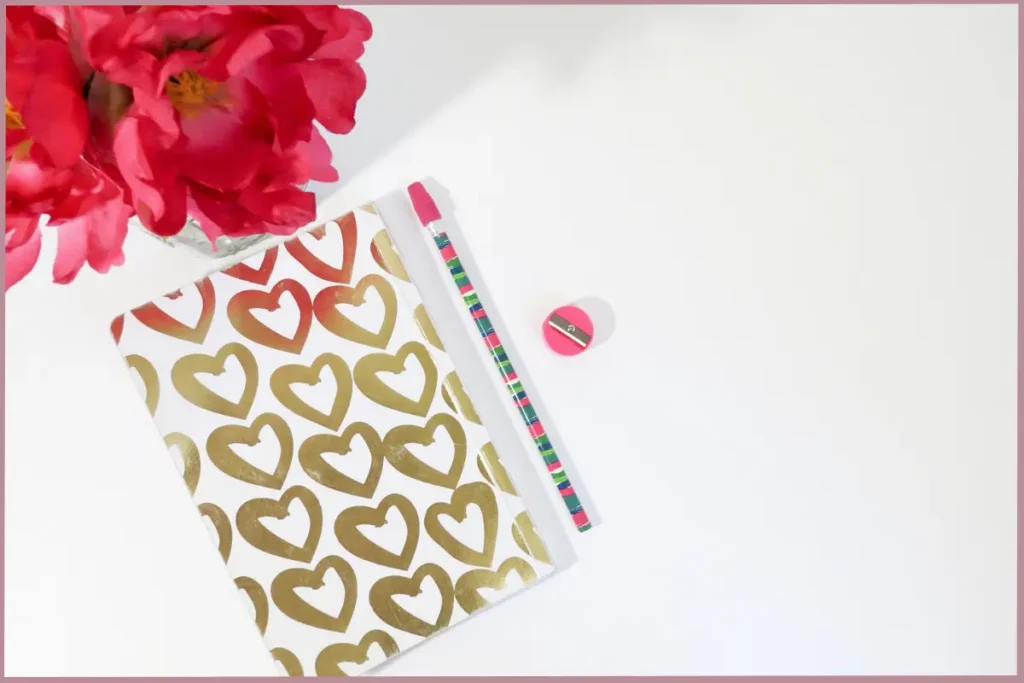
Empty nesting often brings a whirlwind of emotions—pride, sadness, confusion, and even guilt. Journaling gives you a safe space to let those feelings out without judgment.
Writing things down helps untangle emotions that may feel jumbled or hard to explain, making them more manageable.
Think of it as opening up a conversation with yourself. Scribbling down worries, joys, or frustrations allows your mind to slow down and sort through what’s really going on.
Rather than bottling up emotions or feeling like they’re getting the best of you, journaling supports healthy emotional processing and helps you make that transition from loneliness to self-discovery.
Over time, it will become easier to face feelings that may feel overwhelming right now.
2. Enhances Self-Awareness

Becoming an empty nester is a time of rediscovery, and journaling can be your guide.
When you write regularly, you start to notice patterns in your emotions and identify what triggers stress or joy. This kind of self-awareness is empowering – it gives you insight into what you need to thrive in this new stage of life.
You might ask yourself questions through journaling, like: “Why do I feel this way when the house is quiet?” or “What activities bring me a sense of peace?”
Over time, these reflections help you better understand yourself, your emotions, and how to meet your own needs.
Self-awareness gained through journaling also creates room for personal growth, helping you reconnect with who you are outside of motherhood.
3. Encourages Self-Reflection

Amid all the changes, it’s easy to focus on filling your time rather than addressing the emotions underneath.
But self-reflection is a cornerstone of personal growth, and journaling can be a gentle yet transformative way to begin.
By putting your thoughts on paper, you give yourself the space to process feelings – grief over the changing family dynamic, excitement about what’s to come, and everything in between.
Journaling acts as a mirror, reflecting what’s in your heart and helping you sort through the layers of emotion. It’s not just about writing what happened in your day; it’s a process of rediscovering who you are outside of the role of “mom.”
What were your dreams before motherhood took center stage?
What passions have you yet to explore?
Self-reflective journaling gives you a private, judgment-free zone to ask these questions – and find the answers. Use these reflective journal prompts to guide you as you enter this exciting new chapter in your life.
Through regular practice, you can begin to set new goals, map out the next chapter of your life, and reconnect with your authentic self.
4. Boosts Emotional Resilience

Life without the daily demands of parenting can feel like a void, but it’s also a chance to build emotional resilience.
Journaling strengthens this by teaching you how to approach challenges – like loneliness or loss – with healthier coping mechanisms. When you write about your struggles, you’re practicing emotional regulation rather than reacting impulsively.
Beyond coping, journaling helps you reframe how you see the changes in your life. For example, instead of focusing on loss, you might begin to see this chapter as an opportunity to explore hobbies, connect with others, or invest in your growth.
The more you process these ideas on paper, the more prepared you’ll feel to face life’s ups and downs. Slowly, this practice creates a sturdier emotional foundation to handle change with grace and confidence.
5. Supports Personal Growth

As an empty nester mom, the shift from the constantly bustling, child-centered life to one of contemplation and quiet can feel surreal.
This phase is not only a chance to rediscover yourself, but also an invitation to explore what truly lights you up again.
Journaling can be a powerful tool for personal growth, helping you process emotions, reconnect with passions, and set a fresh course for the future.
6. Reduces Stress and Anxiety

The leap from a busy, kid-filled home to quieter days can feel jarring. Stress and anxiety often creep in, especially when everything feels unfamiliar.
Journaling acts as a release valve, letting built-up tension escape. Writing about what’s bothering you can diffuse its intensity by helping your mind acknowledge and organize those thoughts.
For example, if you’re feeling a mix of sadness and overwhelm, putting it into words can give you clarity. Once it’s laid out on the page, those feelings don’t seem as all -encompassing.
Journaling can feel like exhaling after holding your breath for too long – it calms your mind and gives you a needed outlet. The act of writing also signals to your body that it’s time to slow down, which, in turn, reduces anxiety.
7. Fosters Creativity & Self-Expression

Journaling isn’t just about writing – it can also ignite your creative side. Think of it as a blank canvas where you can experiment, play, and rediscover the parts of yourself that may have gone dormant during the busy parenting years.
Explore creative journaling methods: Try art journaling by filling pages with doodles, sketches, or colors that match your mood. Or perhaps poetry speaks to you—start small with free verse and let your thoughts flow.
Rediscover new writing styles: Have you always wanted to write stories or essays? Experimenting with short pieces in your journal can help you tap into unexplored creative interests.
Use storytelling as an outlet: Sometimes, putting your experiences into a narrative helps you process them and even find meaning. Turn to your journal as a place to create personal essays or recount memories. A combination of self-expression and creativity builds not only emotional release but also joy.
Practice stream of consciousness writing: The stream of consciousness writing style encourages you to pen down your unfiltered thoughts in real time. It has interesting results. Try it for a while and see what you come up with.
Even if you don’t consider yourself “artsy,” allow yourself to try different approaches. You might stumble upon a spark that reignites your creative spirit.
8. Helps You Rediscover Personal Interests & Passions
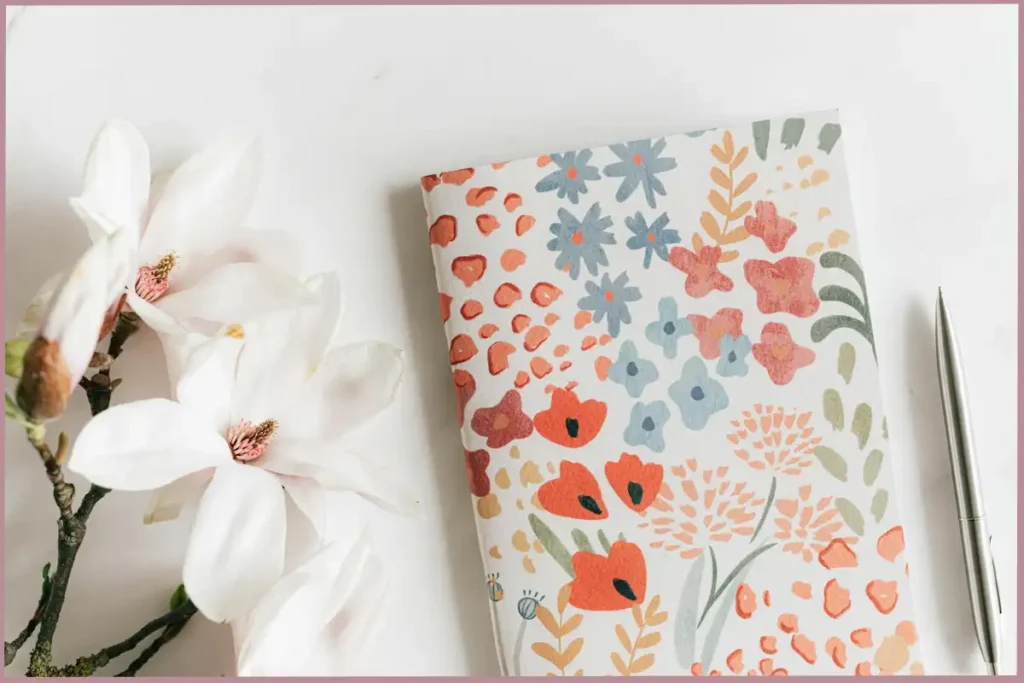
When was the last time you thought about what you enjoy doing? Before raising kids, maybe you loved certain hobbies, music, or activities that were put on hold. Journaling can help you reflect on—and reconnect with—those passions.
Start by asking yourself some questions in your journal:
What did you love doing before the responsibilities of parenthood took center stage?
Are there any skills or hobbies you’ve missed or always wanted to try?
Writing about these interests can bring memories and desires back to life. You may realize you’ve been yearning to return to gardening, knitting, dancing, or even traveling. Capture these ideas in your journal, and you’ll begin to see where you’d like to spend your time and energy now.
This reflection isn’t just about the past—it’s also about building a bridge toward a more fulfilling future. Your journal gives you a safe space to dream again and identify what makes you feel alive.
9. Creates a Sense of Gratitude & Purpose
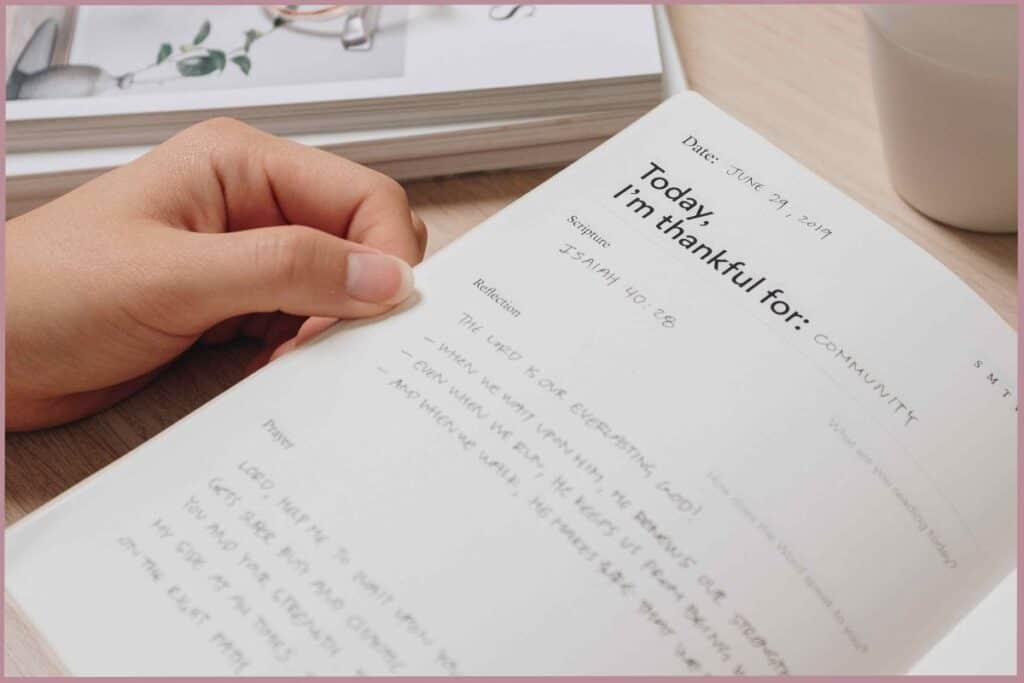
Gratitude journaling is especially powerful for empty nester moms. When life shifts so suddenly, it can be easy to focus on what’s missing. Writing down what you’re thankful for, no matter how small, helps you reframe your perspective.
Every evening, jot down three things that made you smile or feel at peace that day.
Was it having a cup of coffee with a friend?
Or maybe taking the time to watch the bees flit from flower to flower?
A meaningful phone call or memory that surfaced?
Over time, these small moments will create a thread of positivity running through your life. Gratitude journaling strengthens your ability to find joy even during uncertain times and builds a sense of purpose in the present.
10. Helps Reevaluate Priorities
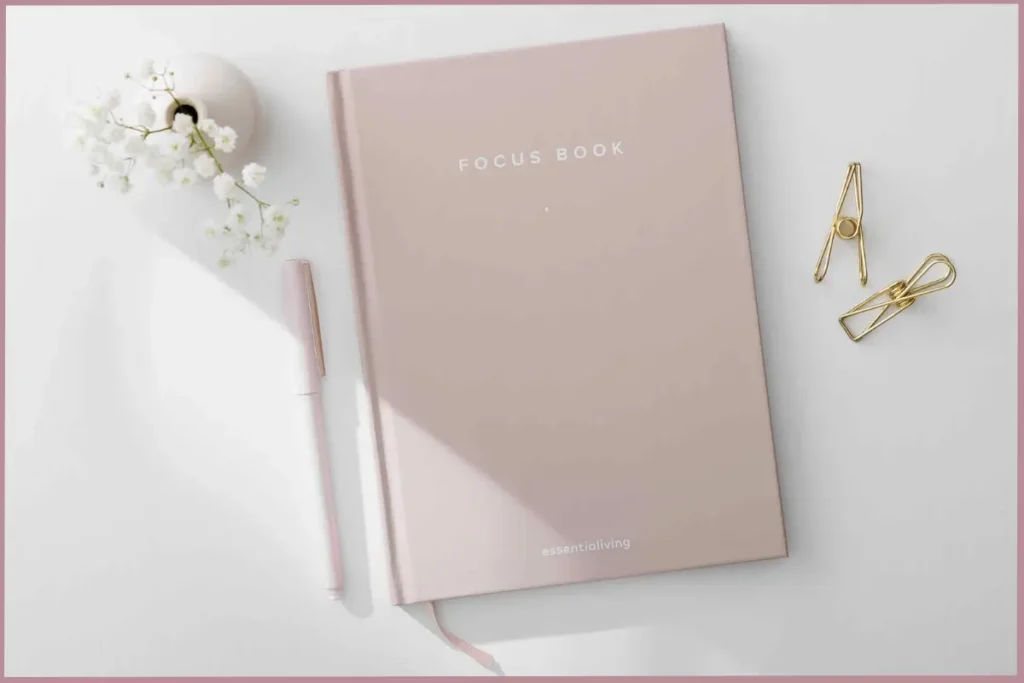
The empty nest phase offers a rare opportunity to step back and examine what truly matters. During the years of raising children, it’s easy to lose sight of what aligns with your personal values and goals. Journaling allows you to pause and evaluate where you want to go from here.
Write out your thoughts about what’s currently taking up space in your life. Are there activities, commitments, or habits that no longer serve you?
What could you let go of to make room for new opportunities?
This kind of reflection helps you identify what’s worth your time and energy, ensuring that the days ahead feel meaningful and intentional.
11. Helps Set Goals for the Next Chapter

Once you’ve reconnected with your interests and reassessed your priorities, it’s time to dream big. Journaling is a powerful tool for goal-setting because it gives you clarity and structure.
Start small by writing about what you want to accomplish in this next phase of life. For example:
Do you want to learn a new skill, like painting or playing an instrument?
Are you considering a career shift, returning to school, or volunteering?
Would you like to explore travel destinations solo or with friends?
Once you know your goals, break them into actionable steps. Write about what you’ll need—time, resources, connections—and use your journal to track progress. Each page becomes a plan for your future, reminding you that this chapter is just as full of potential as the ones that came before.
Journaling gives you a place to dream fearlessly, reminding you that no matter where life takes you, it’s never too late to grow and reinvent yourself.
12. Gives Space to Reflect on Relationships with Family & Friends
One of the often-overlooked benefits of journaling for empty nester moms is how it helps enhance and deepen relationships.
Putting thoughts on paper can help you gain valuable insights into your connections with family and friends and discover ways to strengthen them in this new phase of life.
Your journal provides a private space to explore and identify ways to improve or rebuild certain relationships.
For instance, writing a letter that you never send – pouring out unspoken feelings of love, regret, or gratitude – can help you process emotions and better communicate with loved ones.
Additionally, journaling can help you plan how to nurture these connections moving forward.
Use these inspiring journaling prompts to guide your reflections:
Who do you feel happiest and most authentic around?
Are there friends you’ve lost touch with who you’d like to reconnect with?
Do you feel ready to join new social groups or explore new friendships?
Besides helping you evaluate existing relationships journaling also encourages you to take action. Maybe you’ll start by sending a text to a family member or friend you haven’t spoken to in years.
Or perhaps you’ll investigate local clubs, book groups, or volunteer opportunities where you can meet like-minded people.
As you note these goals in your journal, you’re setting intentions to expand and strengthen your social circles. Investing in meaningful relationships can bring a renewed sense of community and belonging during this stage of life.
Practical Tips to Start a Journaling Practice
Journaling can be one of the most meaningful self-care tools for empty nester moms.
It’s more than just writing down your thoughts it creates a space for yourself to let emotions flow, discover new goals, and rekindle your passions.
If you’re new to journaling, you may wonder where or how to start or worry you’ll do it “wrong.”
The beauty of journaling is that there’s no one-size-fits-all approach. You can make it as simple or creative as you’d like.
Here are some practical tips to build a journaling habit that works for you.
Pick the Right Tools and Environment
The beauty of journaling is its simplicity—all you really need is a notebook and a pen. However, having tools that feel good in your hands or bring you joy can make the habit more inviting.
Pick a journal that inspires you. It could be a beautifully bound notebook, a simple spiral pad, or even a digital journaling app. The key is to choose something that fits your style and preferences.
Find pens that glide. Using a pen you love can make the act of writing more pleasurable. Whether it’s a smooth gel pen or a classic ballpoint, experiment to find one that works for you.
Create a comfortable space. Set up in a quiet corner of the house, perhaps with natural light or calming scents like a candle or essential oil. Make it a spot where you can relax and focus.
Start small. You don’t need to journal for hours. Even 5-10 minutes a day can make a difference. A short, consistent practice is better than aiming for perfection.
When you choose tools that feel personal and an environment that soothes you, journaling becomes a ritual you look forward to each day.
Choose the Right Journaling Technique
Not all journaling looks the same, and that’s a good thing. Finding the right style will make the process more enjoyable and sustainable.
Here are a few popular journaling methods to consider:
Gratitude Lists: Perfect for those short on time or unsure what to write about. Each day, jot down three things you’re grateful for. These could be as simple as a kind word from a friend or the comfort of a warm cup of tea. Over time, practicing gratitude trains your brain to focus on the positive.
Bullet Journaling: If you love structure, this method combines journaling with planning. Use bullet points, sections, or charts to track moods, habits, or goals while leaving room for quick reflections. It’s a great way to stay organized while nurturing your mental health.
Freewriting: Feeling overwhelmed or unsure where to start? Freewriting, also known as stream of consciousness writing, lets you pour out thoughts without judgment or structure. Don’t worry about grammar or spelling – just let your pen move. It’s like having a heart-to-heart with yourself.
Prompt-Based Writing: Sometimes, a little direction helps. Try responding to prompts like “What made you happy today?” or “What’s something you want to achieve this year?” Prompts can ease the pressure of staring at a blank page.
It’s okay to experiment with different techniques until you find what feels natural. You might even combine methods, using freewriting on tough days and gratitude lists when you need a dose of positivity.
Create a Routine
Consistency is key to making journaling a rewarding habit, but it doesn’t have to feel like a chore. Start small and choose a time that fits naturally into your day.
Here’s how to create a routine you’ll look forward to:
Pick a Time That Works Best: Are you a morning person? Start your day with a few moments of reflection. Prefer winding down at night? Use your journal to let go of worries before bed. Find what feels easiest to stick with.
Keep It Short and Sweet: You don’t need to write pages every time. Even 5-10 minutes can make a big difference. Remember, quality matters more than quantity.
Create a Journaling Space: Set up a cozy spot where you can write uninterrupted. This could be your favorite chair, a corner of the kitchen table, or even outside in the sunshine. The right environment helps create mental focus.
Use Tools You Enjoy Using: Treat yourself to a notebook and pen you enjoy using. Some moms prefer pretty, decorative journals, while others feel more comfortable with a plain spiral notebook. Choose what inspires you.
Pair It With Another Habit: Pair journaling with something you already do daily, like having your morning coffee or getting into bed. Linking habits makes it easier to remember.
The key is to make journaling feel like a gift to yourself, not another task on your to-do list. Once it becomes part of your routine, you’ll start to look forward to this time of reflection.
Journaling offers compelling benefits as a transformative tool for empty nester moms. It offers a safe space to process emotions, rediscover passions, and regain purpose in this new phase of life.
Writing down your thoughts and feelings in a journal is a simple habit that encourages clarity, peace, and self-reflection, helping you focus on the opportunities ahead rather than what’s been left behind.
Why not give it a try?
Start small.
Grab a notebook, a pen, and carve out a few minutes for yourself each day. It’s a small step with the potential for profound impact.





